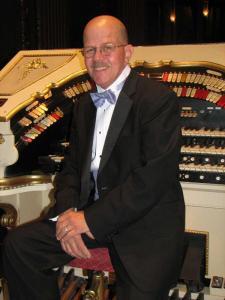On Saturday evening, April 6, 2019, an enthusiastic crowd of nearly 200 welcomed organist Tony Thomas to Pittsburgh for a highly anticipated screening of Buster Keaton’s 1928 film The Cameraman.
Although Thomas is renowned for his skills as an improviser and film accompanist, and although he has performed for Pittsburgh Area Theatre Organ Society (PATOS) before, this was his first time accompanying a silent film in Pittsburgh. The audience of young and old included seasoned silent film fans alongside those new to the art form.
As a prelude to the Keaton feature, Thomas opened the program with two Milt Buckner-inspired organ solos: “We’ll Be Together Again” (co-written by Frankie Laine) and Buckner’s own “Jumpin’ at the Zanzibar.” While Thomas seemed to favor the organ’s piano sound for his sweeping right-hand improvisations, he made full use of the Wurlitzer’s many other sounds. Some clever call-and-response passages found his hands hopping nimbly from one manual to another and back again. Once properly warmed up, Thomas took a swig of water (eliciting a round of applause) and introduced the main attraction: The Cameraman.
 The 1928 film was Buster Keaton’s first for M-G-M, and to many Keaton enthusiasts, it marks the end of Keaton’s “golden age.” For much of the ’20s, Keaton had enjoyed considerable artistic control over his films, producing such highly regarded pictures as The General, Steamboat Bill, Jr., Our Hospitality, and Seven Chances. With the move to M-G-M, Keaton’s genius was soon smothered by the bureaucratic studio system, and his films there are often dismissed as mediocre at best. Still, he managed to retain enough creative input for The Cameraman to be a very good film, with a number of genuinely funny moments.
The 1928 film was Buster Keaton’s first for M-G-M, and to many Keaton enthusiasts, it marks the end of Keaton’s “golden age.” For much of the ’20s, Keaton had enjoyed considerable artistic control over his films, producing such highly regarded pictures as The General, Steamboat Bill, Jr., Our Hospitality, and Seven Chances. With the move to M-G-M, Keaton’s genius was soon smothered by the bureaucratic studio system, and his films there are often dismissed as mediocre at best. Still, he managed to retain enough creative input for The Cameraman to be a very good film, with a number of genuinely funny moments.
When Thomas performed for PATOS in 2014, he showcased his skill as an interpreter of jazz tunes from the 1940s, ’50s, and ’60s, with an easygoing, improvisational style. I’ll confess that I was a bit apprehensive that he might take a musically similar approach to The Cameraman, undermining Keaton’s cinematic world of the ’20s with the anachronistic sounds of “On Green Dolphin Street.” Once the opening M-G-M Lion’s “roars” were out of the way and the title cards appeared, my worries dissolved. Thomas brought the film to vivid life with a dynamic but thoroughly convincing score that sounded appropriately “of the era.”
Thomas knows that a good film accompaniment doesn’t draw attention to itself through the overuse of recognizable pop songs, though he also knows that a well-placed pop tune can enhance a scene’s comedic or dramatic effectiveness. During a scene in which Keaton and his girlfriend, Sally (Marceline Day), are at a large indoor swimming pool, Keaton tries feverishly to hold Sally’s attention, even as she draws the eye of other more athletic (and arguably more handsome) young men—all to the tune of “Ain’t She Sweet.” Thomas sprinkled a few other pop tunes throughout the performance, but for the most part, his music stayed in the background, supporting the on-screen action and heightening our emotional response in the way a good film score should.
As a side note: I don’t know if Thomas had memorized his score or improvised most of it; either way, the polish and seamless, natural flow of the performance struck me as all the more impressive when I noticed he didn’t have a note of written music on the empty stand in front of him.
I am sure that the majority of those in attendance for The Cameraman would agree that to truly enjoy and appreciate a silent film, you need to see it on the big screen in the company of an appreciative audience and with the musical accompaniment in the hands of a master like Tony Thomas. I’ve been fortunate to attend a number of silent film screenings through the years (in Pittsburgh and elsewhere), and it still amazes me how the medium’s most obvious limitation is more than transcended in a showing like we had on April 6.
Whether it’s Keaton swimming around a crowded pool in a comically frantic search for some stitch of clothing to replace the oversized swimsuit he has lost, or Keaton staring pitifully after his girlfriend as she strolls away arm-in-arm with another man, Thomas’s accompaniment on the Wurlitzer spoke more eloquently than words. In this case, the final product really was greater than the sum of its parts, delivering a thrilling and memorable movie-going experience. Thank you, Mr. Thomas—and all those in attendance—for a spectacular evening!
For more information about the Pittsburgh Area Theatre Organ Society (including a list of upcoming concerts and film screenings), please visit: www.pittsburghtheatreorgan.com.
Bryan Wright is a pianist, teacher, record producer, collector, composer, and musicologist, specializing in ragtime, early jazz, and related styles. Bryan is the founder of Rivermont Records (rivermontrecords.com) and lives in Pittsburgh, Pennsylvania. Visit him online at www.bryanswright.com.





















